实验5
实验1.1
运行代码
#include<stdio.h>
#define N 4
int main()
{
int x[N] = {1,9,8,4};
int i;
int *p;
for(i=0;i<N;++i)
printf("%d",x[i]);
printf("\n");
//for(i=0;p<x+N;++p)
//printf("%d",*p);
//printf("\n");
//p=x;
//for(i=0;i<N;++i)
//printf("%d",*(p+i));
//printf("\n");
// p=x;
//for(i=0;i<N;++i)
//printf("%d",p[i]);
//printf("\n");
system("pause");
return 0;
}
运行截图
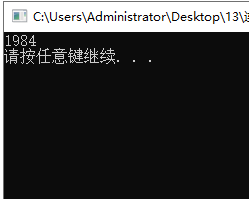
实验1.2
运行代码
#include<stdio.h>
int main()
{
int x[2][4]={{1,9,8,4},{2,0,4,9}};
int i,j;
int *p;
int (*q)[4];
for(i=0;i<2;++i)
{
for(j=0;j<4;++j)
printf("%d",x[i][j]);
printf("\n");}
for(p=&x[0][0],i=0;p<&x[0][0]+8;++p,++i)
{
printf("%d",*p);
if((i+1)%4==0)
printf("\n");
}
for(q=x;q<x+2;++q)
{ for(j=0;j<4;++j)
printf("%d",*(*q+j));
printf("\n");
}
system("pause");
return 0;
}
运行截图
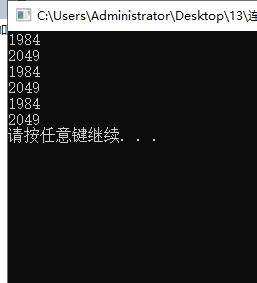
实验2.1
运行代码
#include<stdio.h>
#include<string.h>
#define N 80
int main()
{ char s1[]="Learning makes me happy";
char s2[]="Learning makes me sleepy";
char tmp[N];
printf("sizeof(s1) vs .strlen(s1):\n");
printf("sizeof(s1) = %d\n",sizeof(s1));
printf("strlen(s1) = %d\n",strlen(s1));
printf("\nbefore swap:\n");
printf("s1:%s\n",s1);
printf("s2:%s\n",s2);
printf("\nswapping...\n");
strcpy(tmp,s1);
strcpy(s1,s2);
strcpy(s2,tmp);
printf("\nafter swap:\n");
printf("s1:%s\n",s1);
printf("s2:%s\n",s2);
system("pause");
return 0;
}
运行截图
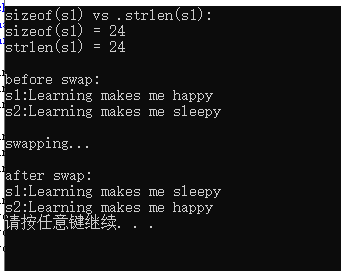
回答问题:大小是24个字节。sizeof计算所占空间大小,strlen计算字符长度。
不能,给一维数组定义时要说明长度分配内存。
交换了。
实验2.2
运行代码
#include<stdio.h>
#include<string.h>
#define N 80
int main()
{ char *s1="Learning makes me happy";
char *s2="Learning makes me sleepy";
char *tmp;
printf("sizeof(s1) vs .strlen(s1):\n");
printf("sizeof(s1) = %d\n",sizeof(s1));
printf("strlen(s1) = %d\n",strlen(s1));
printf("\nbefore swap:\n");
printf("s1:%s\n",s1);
printf("s2:%s\n",s2);
printf("\nswapping...\n");
tmp=s1;
s1=s2;
s2=tmp;
printf("\nafter swap:\n");
printf("s1:%s\n",s1);
printf("s2:%s\n",s2);
system("pause");
return 0;
}
运行截图
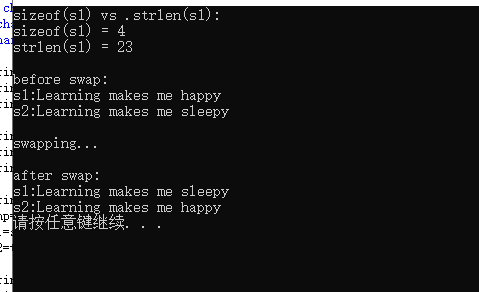
回答问题:字符串。sizeof计算指针变量s1所占内存空间大小,strlen计算存放字符串长度。
能。task2.1定义一个字符数组,把字符储存在数组里,task2.2是定义一个指针变量,先占用内存,再把字符串储存进去。
交换的是指针变量的值,在内存单元中没有交换。
实验3
运行代码
#include<stdio.h>
void str_cpy(char *target, const char *source);
void str_cat(char *str1, char *str2);
int main()
{
char s1[80],s2[20]="1984";
str_cpy(s1,s2);
puts(s1);
str_cat(s1," Animal Farm");
puts(s1);
system("pause");
return 0;
}
void str_cpy(char *target, const char *source)
{
while (*target++=*source++);
}
void str_cat(char *str1, char *str2)
{
while(*str1)
str1++;
while(*str1++=*str2++);}
运行截图

实验4
运行代码
#include<stdio.h>
# define N 80
int func ( char *);
int main()
{char str [80];
while (gets ( str )!= NULL )
{if ( func ( str ))
printf (" yes\n ");
else
printf (" no\n ");}
system("pause");
return 0}
int func ( char * str )
{char * begin ,* end ;
begin = end = str ;
while (* end )
end ++;
end --;
while ( begin < end )
{if (* begin !=* end )
return 0;
else
{begin ++;
end --;}}
return 1;}
运行截图
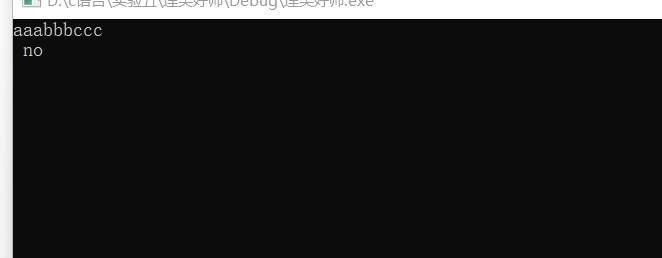
实验5
运行代码
#include<stdio.h>
#define N 80
void func(char *);
int main()
{
char s[N];
while(scanf("%s",s)!=EOF)
{
func(s);
puts(s);
}
system("pause");
return 0;
}
void func(char *str)
{
int i;
char *p1,*p2,*p;
p1=str;
while(*p1=='*')
p1++;
p2=str;
while(*p2)
p2++;
p2--;
while(*p2=='*')
p2--;
p=str;
i=0;
while(p<p1)
{
str[i]=*p;
p++;
i++;
}
while(p<=p2)
{if(*p!='*')
{ str[i]=*p;
i++;
}
p++;
}
while(*p!='\0')
{
str[i]=*p;
p++;
i++;
}
str[i]='\0';
}
运行截图
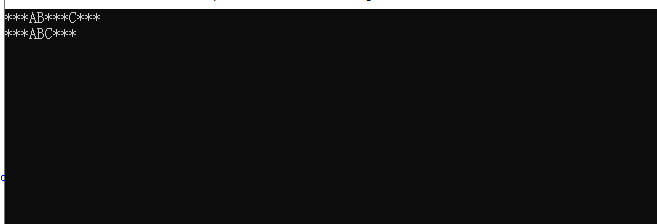
实验6.1
运行代码
#include <stdio.h>
#include<string.h>
void sort(char *name[],int n);
int main()
{
char *course[4]={"C Program",
"C++ Object Oriented Program",
"Operating System",
"Date Structure and Algorithms"};
int i;
sort(course,4);
for(i=0;i<4;i++)
printf("%s\n",course[i]);
system("pause");
return 0;
}
void sort(char *name[],int n)
{ int i,j;
char *tmp;
for(i=0;i<n-1;++i)
for(j=0;j<n-1-i;++j)
if(strcmp(name[j],name[j+1])>0)
{
tmp=name[j];
name[j]=name[j+1];
name[j+1]=tmp;
}}
运行截图
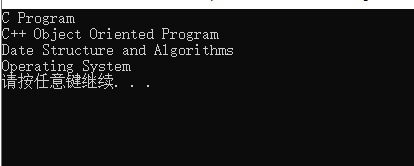
实验6.2
运行代码
#include <stdio.h>
#include<string.h>
void sort(char *name[],int n);
int main()
{
char *course[4]={"C Program",
"C++ Object Oriented Program",
"Operating System",
"Date Structure and Algorithms"};
int i;
sort(course,4);
for(i=0;i<4;i++)
printf("%s\n",course[i]);
system("pause");
return 0;
}
void sort(char *name[],int n)
{ int i,j,k;
char *tmp;
for(i=0;i<n-1;i++)
{k=i;
for(j=i+1;j<n;j++)
if(strcmp(name[j],name[k])<0)
k=j;
if(k!=i)
{tmp=name[i];
name[i]=name[k];
name[k]=tmp;
}}}
运行截图
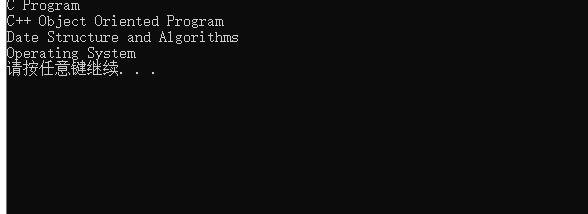
回答问题:交换的是指针变量的值。
实验7
运行代码
#include <stdio.h>
#include<string.h>
#define N 5
int check_id(char *str);
int main(){
char *pid[N] = {"31010120000721656X",
"330106199609203301",
"53010220051126571",
"510104199211197977",
"53010220051126133Y"};
int i;
for(i=0;i<N;++i)
if(check_id(pid[i]))
printf("%s\tTure\n",pid[i]);
else
printf("%s\tFalse\n",pid[i]);
return 0;}
int check_id(char *str)
{
int i;
if(strlen(str)==18)
{
for(i=0;i<17;i++)
if(48<str[i]&&str[i]<57)
if((48<str[17]&&str[17]<57)||(str[17]=='X'))
return 1;
else
return 0;
else
return 0;}
else
return 0;}
运行截图
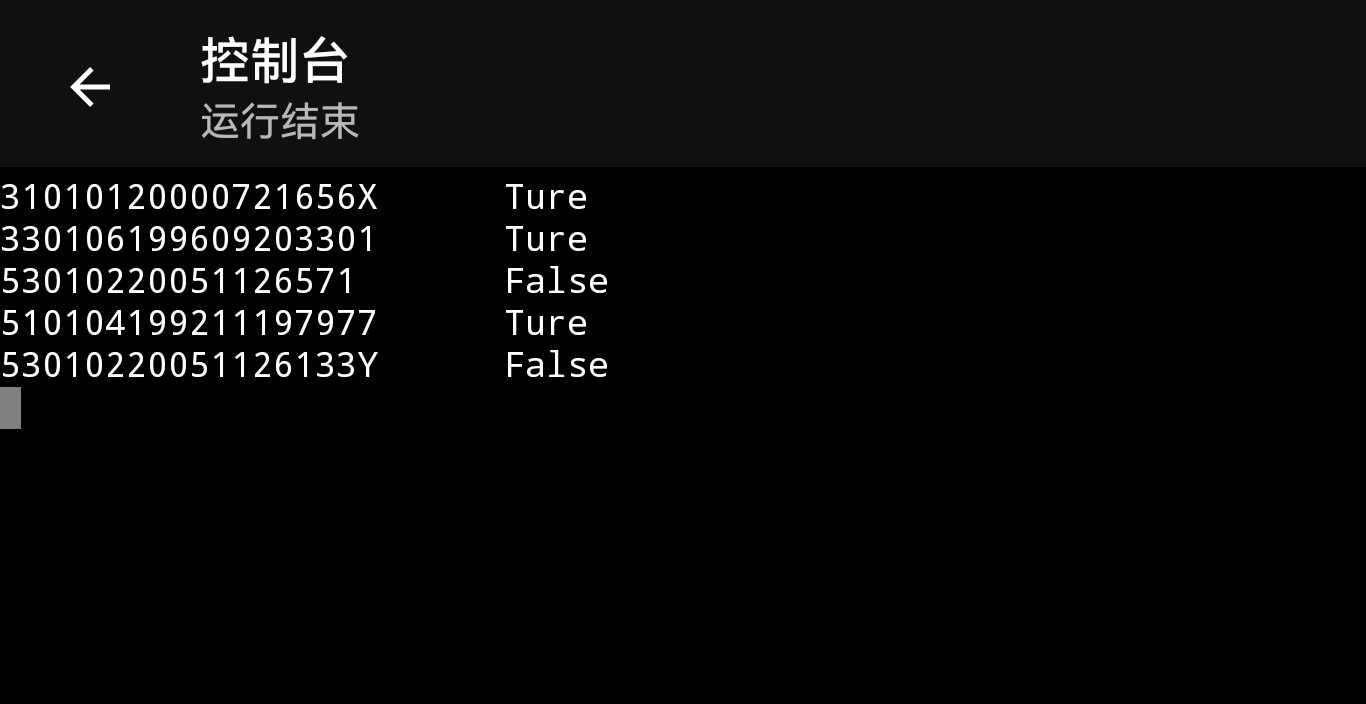
实验8
运行代码
#include <stdio.h>
#define N 80
void encoder(char *s);
void decoder(char *s);
int main(){
char words[N];
printf("输入英文文本:");
gets(words);
printf("编码后的英文文本:");
encoder(words);
printf("%s\n",words);
printf("对编码后的英文文本解码:");
decoder(words);
printf("%s\n",words);
system("pause");
return 0;
}
void encoder(char *s)
{
int i;
for(i=0;s[i]!='\0';i++)
if((s[i]>='a'&&s[i]<'z')||s[i]>='A'&&s[i]<'Z')
s[i]=s[i]+1;
if(s[i]=='z')
s[i]='a';
if(s[i]=='Z')
s[i]='A';
}
void decoder(char *s)
{
int i;
for(i=0;s[i]!='\0';i++)
if((s[i]>'a'&&s[i]<='z')||s[i]>'A'&&s[i]<='Z')
s[i]=s[i]-1;
if(s[i]=='a')
s[i]='z';
if(s[i]=='A')
s[i]='Z';
}
运行截图
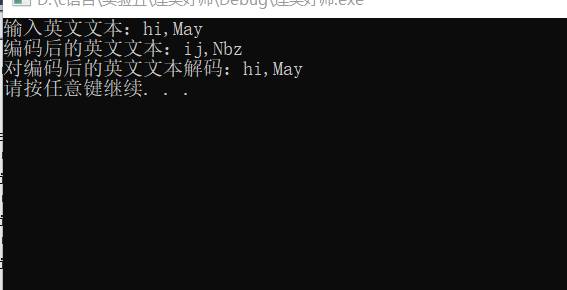



 浙公网安备 33010602011771号
浙公网安备 33010602011771号